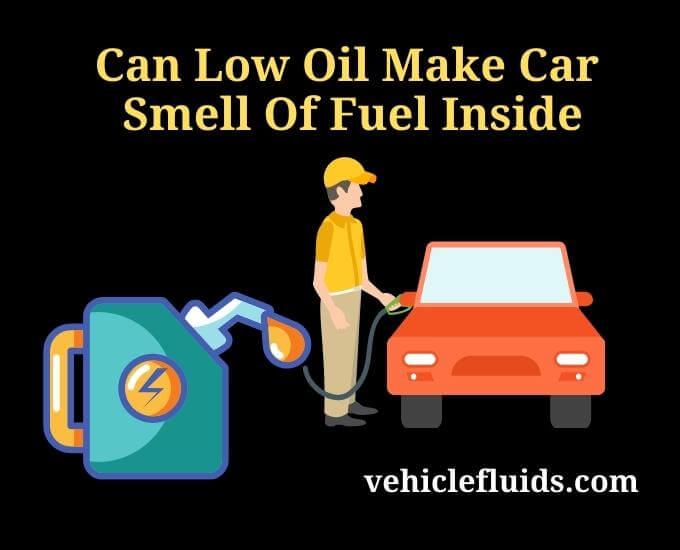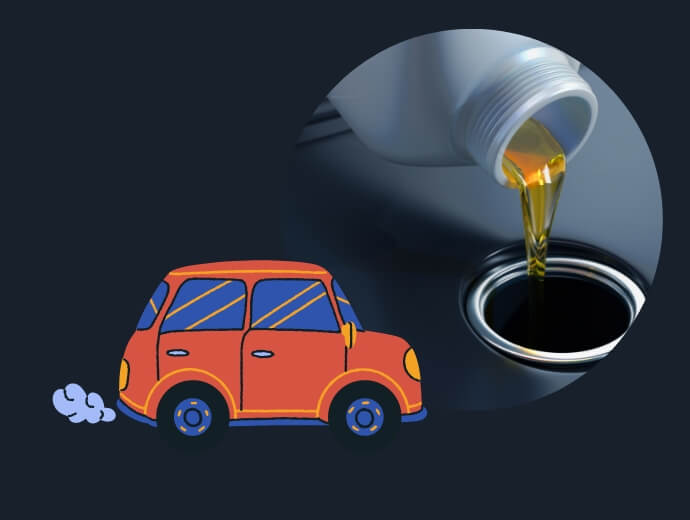The smell of fuel inside a car can be a cause for concern, especially if the odor is strong and persistent. One of the most common reasons for this is low oil levels. When the oil level in a car is low, it can result in the engine running hotter and increase the chance of fuel vaporizing and leaking into the engine bay.

This, in turn, can lead to the strong smell of fuel inside the car. It’s important to regularly check the oil levels in a vehicle and refill as needed to maintain its proper function and avoid unpleasant fuel odor.
Reason for Smelling Fuel Inside Your Car
In some cases, a fuel smell in your car could be caused by a leak in your fuel line, a failing fuel pump, a cracked fuel tank, or a malfunctioning fuel injector. In any case, it’s important to get to the root of the problem as soon as possible to ensure the safety of your car and those around you.
Leaking Fuel Injectors
If you smell fuel inside your car, it could be a sign of a leak in one of the fuel injectors. This could cause gasoline to leak into the engine compartment, resulting in a strong fuel odor.
Fuel Tank Ventilation System Failure
The fuel tank ventilation system helps prevent a vacuum from forming inside the fuel tank, which can cause fuel to be drawn into the engine. If this system fails, you may smell fuel inside the car.
Fuel Line Leak
A fuel line leak can result in gasoline leaking onto the ground or into the engine compartment, causing a strong fuel odor. This can also be a potential fire hazard.
Evaporative Emissions System Leak
The evaporative emission system controls fuel vapors from escaping into the atmosphere. If there is a leak in this system, you may smell fuel inside the car. This is not only unpleasant but can also be harmful to the environment.
Symptoms of Low Oil in Your Car
Low oil levels can cause increased friction and heat in the engine, which causes the fuel to evaporate and rise into the cabin, resulting in the smell of fuel. If you notice this smell, it’s important to check your oil levels and, if necessary, add more oil. Not paying attention to the oil levels in your car can cause a decrease in its performance.
The following are common symptoms of low engine oil levels in a car:

Engine Noise
When the oil level is low, the engine may start to make a knocking or ticking sound. This is because the engine parts are not properly lubricated and are rubbing against each other.
Engine Warning Light
In most modern cars, the engine warning light will come on when the oil level is low. This is a clear sign that you need to check the oil level and add more if necessary.
Engine Performance
Low oil levels can affect the engine’s performance, making it feel sluggish or unresponsive. This is because the engine is not getting enough lubrication to function properly.
Engine Overheating
If the oil level is very low, the engine may overheat. This is because the oil helps to regulate the engine’s temperature, and if there is not enough oil, the engine can become too hot and start to overheat.
Oil Pressure Warning Light
Some cars also have an oil pressure warning light that will come on if the oil level is too low. This is a clear sign that the engine is not getting enough oil and that you need to add more.
If you suspect that your car’s oil level is low, it’s important to check it immediately and add more oil if necessary to avoid further damage to your engine.
Causes of Low Oil
Low oil levels in your car can result in a variety of issues, including increased fuel consumption and decreased engine performance. But one of the most noticeable effects of low oil levels is a strong smell of fuel inside your car.
Leaks and Seals
A car that is leaking oil can cause a strong gasoline smell inside the vehicle. If you’re noticing a fuel smell in your car, it is important to investigate the cause of the smell. Low oil levels can create a fuel smell.
Oil Changes
This can cause a smell of fuel in your car, as well as decreased performance and even engine damage. To prevent this, it is essential to get regular oil changes, as well as keep an eye on your oil levels.
Heat and Overheating
Low oil levels can cause your car to run hotter than normal, and the heat can cause the fuel to evaporate into the cabin of your car, leading to a strong fuel smell.
Fuel Contamination
Fuel contamination can be a major issue for car owners. If you notice a strong smell of fuel inside your car, this could be a sign that your car is suffering from low oil levels. In addition, fuel can also enter the car’s interior through evaporation, leading to a fuel smell inside the car.
Diagnosing Low Oil Levels
Low oil levels can be caused by anything from a slow leak to simply failing to check and top off the oil regularly. In any case, it’s important to identify and address the issue, as low oil levels can cause major damage to your engine.
Not only does it reduce the engine’s lubrication, but it also leaves it more exposed to dirt and debris, which can cause further damage. Here are some steps to diagnose low oil levels:
| 1. | Check the oil level regularly with the dipstick. Make sure the engine is off, and the vehicle is on level ground. |
| 2. | Look for leaks in the oil system, such as around the oil pan, oil filter, and engine seals. |
| 3. | Check for signs of excessive oil consumption, such as blue smoke from the exhaust or an increase in the oil level on the dipstick after topping off. |
| 4. | Monitor the oil pressure gauge or warning light. If the pressure is low, it could indicate a problem with the oil pump or clogged oil passages. |
| 5. | When the engine is checked by a mechanic if you suspect a problem, They can run tests and check the oil system for leaks, wear, or other issues. |
Risks of Fuel Smell in a Car
As a car owner, it is important to understand the risks associated with a fuel smell in your car. A fuel smell in a car is not only unpleasant but can also be dangerous and even life-threatening if not addressed promptly. The following are some of the risks of fuel smell in a car:
Fire Hazard
A fuel leak in a car can be a fire hazard, especially if the fuel comes into contact with hot surfaces such as the engine or exhaust system. This can lead to a fire, which can cause damage to the car and also put passengers and other drivers at risk.
Health Risks
The fumes can irritate the eyes, nose, and throat and cause headaches, nausea, and dizziness. Long-term exposure to gasoline fumes can lead to more serious health problems, such as respiratory problems and damage to the nervous system.
Explosion Risk
Fuel leaks in a car can also lead to an explosion if the fumes reach an ignition source, such as a spark or flame. This can cause serious damage to the car and also put passengers and other drivers at risk.
Engine Damage
A fuel leak can also damage the engine if the fuel gets into the oil or other parts of the engine. This can cause the engine to fail, which can be expensive to repair and can also make the car unsafe to drive.
Costly Repairs
Fuel leaks can be difficult and expensive to repair, especially if the leak is in a hard-to-reach area of the car. In addition, repairing a fuel leak will typically require the car to be out of service for several days, which can be inconvenient for the owner.
Prevention of Low Oil
To prevent low oil levels in an engine, it is important to regularly check the oil level and add oil as needed to maintain the proper level. It is also recommended to have regular oil changes and use the correct type of oil specified by the manufacturer.
Any leaks or issues with the oil system in your car should be addressed right away to prevent any further damage.
Regularly Scheduled Oil Changes
Regularly scheduled oil changes are an important part of car maintenance, as they help to prevent your vehicle from experiencing problems such as reduced engine performance, increased emissions, and decreased fuel efficiency.
So, make sure to stay up to date on your oil changes for not only better performance, but a better smell too.
Check Fluid Levels Regularly
It’s important to keep an eye on your vehicle’s fluid levels to make sure everything is running smoothly. Checking the oil levels regularly and topping them up when necessary can help to keep your car in good condition and prevent any unpleasant smells from developing.
Pay Attention to Warning Lights
Low oil levels can result in a decrease in fuel efficiency, damage to the engine, and can even cause your car to break down. Paying attention to the warning lights and ensuring that your oil levels are topped up can help to prevent this from happening and keep your car running smoothly.
Use Synthetic Oils
Using synthetic oil in your car can help keep it running smoothly, but it can also help reduce the smell of gasoline inside the cabin. Synthetic oil is designed to break down more slowly than regular petroleum-based oil, meaning it won’t get contaminated as quickly.
Last Remarks
Low oil levels in a car’s engine can indeed result in a fuel odor inside the vehicle. This occurs because when the oil level is low, the oil pump may not be able to distribute oil effectively to all parts of the engine, causing the engine to run hotter. This increase in temperature can cause oil to burn off, resulting in a fuel odor.
A low oil level can lead to increased engine wear and can cause damage to the engine over time.
It’s important to regularly check the oil level in your vehicle and top it up as needed to maintain a healthy engine and avoid a fuel odor inside the car.
